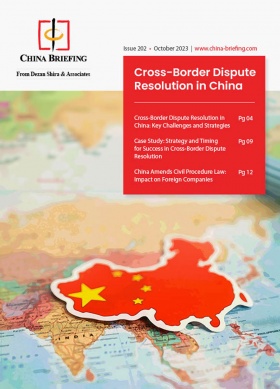China Travel Update – Customs Scraps Health Declaration Requirement for All Travelers from November 1
Travelers leaving and entering China are no longer required to fill in the China health declaration form, meaning that China has now lifted all travel requirements related to COVID-19. Travelers should still voluntarily report themselves to Customs staff if they have symptoms or have been diagnosed with an infectious disease.
China’s General Administration of Customs (“Customs”) has announced that, as of Wednesday, November 1, 2023, it will no longer require people leaving and entering China to fill in the Entry/Exit Health Declaration Card (“Health Declaration Card”). This card was implemented during the COVID-19 pandemic to screen travelers for symptoms of COVID-19 by asking them to fill out a survey on their current health conditions and symptoms. The system then generated a QR code that travelers had to show to Customs staff when leaving or entering the country.
The removal of the Health Declaration Card requirement means that China has now lifted all COVID-era restrictions and requirements for travelers leaving and entering the country. This move could help to encourage more international travel to and from China, and will further improve the travel experience for passengers.
Existing regulations on declaring possible symptoms of infectious disease when traveling will still be in place, as we discuss below.
What do you need to enter China now?
With the lifting of the Health Declaration Card, travelers no longer need to undergo any additional procedures related to COVID-19 or health in order to enter or leave China from abroad. This includes those traveling to and from Hong Kong, Macao, and Taiwan.
However, travelers without Chinese residency or citizenship will still need to have a valid visa or entry permit in order to enter China. People who have overstayed their visa or entry permit when leaving the country may be subject to fines or other penalties.
In March 2023, China resumed issuing all types of visas for foreign nationals, meaning that people can now enter China for tourism and business, as well as work, study, and family reunions.
Travelers will also be required to fill in an arrival and departure card with details of their trip and accommodation in China, which will be provided by airline staff on the airplane or at the airport at immigration. This is a standard procedure that has been in place since before the pandemic.
Requirements for reporting symptoms of infectious disease
The Customs announcement on the scrapping of the Health Declaration Card makes it clear that people leaving and entering China who show symptoms of or who have been diagnosed with an infectious disease are still required to declare their health situation to Customs of their own volition. Symptoms may include fever, cough, difficulty breathing, vomiting, diarrhea, rash, or unexplained subcutaneous bleeding, according to the notice.
After declaring their symptoms to Customs, they must then cooperate with staff on any screening and quarantine procedures necessary, such as a temperature probe, epidemiological survey, medical inspection, sampling, testing, and so on.
Anyone who seeks to conceal or evade quarantine will bear corresponding legal responsibilities, and anyone who causes the spread of an infectious disease or poses a serious risk of spread will bear corresponding criminal responsibilities.
About Us
China Briefing is written and produced by Dezan Shira & Associates. The practice assists foreign investors into China and has done so since 1992 through offices in Beijing, Tianjin, Dalian, Qingdao, Shanghai, Hangzhou, Ningbo, Suzhou, Guangzhou, Dongguan, Zhongshan, Shenzhen, and Hong Kong. Please contact the firm for assistance in China at china@dezshira.com.
Dezan Shira & Associates has offices in Vietnam, Indonesia, Singapore, United States, Germany, Italy, India, Dubai (UAE), and Russia, in addition to our trade research facilities along the Belt & Road Initiative. We also have partner firms assisting foreign investors in The Philippines, Malaysia, Thailand, Bangladesh.
- Previous Article Temporary Residence Registration in China – A Guide for Foreign Residents and Visitors
- Next Article Il passaggio della Cina dal consumo energetico al controllo delle emissioni di carbonio: l’impatto sulle aziende








